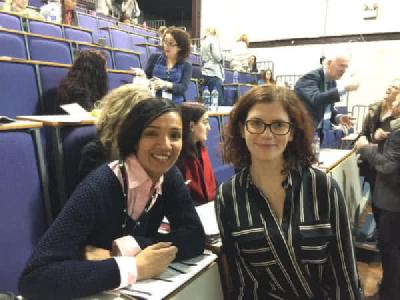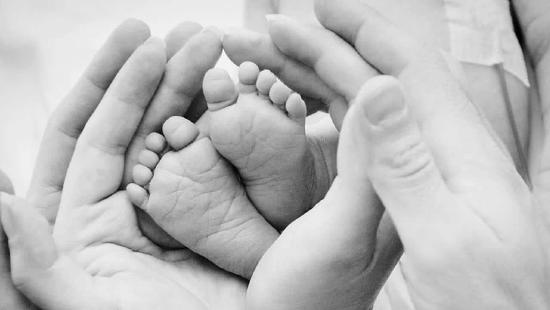Rubbena Aurangzeb-Tariq, our Lead Trainer, attended the Deaf Nest Conference which was held at Kingston University in London on 1st of March. The title of the conference - ‘Together Towards Tomorrow’ gave an impression that things are moving forward in terms of improving midwifery support to meet the needs of Deaf women. It was good to link up with professional associates from the British Pregnancy Advisory Service (BPAS), Education for Choice and Brook, to name but a few.
Katherine O’Brien (Media and Public Policy Manager at BPAS), liaised with Rubbena in presenting the findings from our joint ‘No Sign of Support Understanding Young D/deaf people’s Sexual and Reproductive Health Needs’ research. This research details shocking statistics about how poorly educated young deaf people are regarding their sexual health, due to woefully poor access to sexual health education. A lack of Deaf awareness in health services impacts upon deaf people using the services.
First up was Brain Symington (MBE), President of the World Congress on Mental Health and Deafness and Director of DeafHear Belfast. Brian has a wealth of knowledge on deafness and the support needs of deaf people. His talk, ‘Let’s start at the very Beginning’, looked at the support needs of Deaf mothers and emphasised the need for all concerned to apply greater focus to this area.
In her talk ‘Assessing and Changing Health Care Professionals Attitudes and Knowledge of Deafness’, Dr Margaret du Feu, discussed her own experience of deafness and cochlear implantation.’ Although Dr De Feu has had positive experiences of changes being made to accommodate her needs, her experiences were that of an educated health professional and the scale of changes required to meet ‘grassroots’ Deaf peoples’ needs will require a greater degree of recognition and acceptance of the need for profound changes in approach.
Vivien Sabel (Clinical Psychotherapist and Writer) gave a very emotional talk entitled ‘The Gifts of Deaf Parenting. The Blossom Method and Beyond’. She shared her deaf mother’s shame about her deafness and her own experience of hearing loss. Vivien discussed the great difficulties her mother faced and how upsetting this was. Through deaf studies and learning sign language Vivian developed a greater empathic understanding of her mother and believes that this current generation can successfully pass on Deaf culture and identity to the next generation.
Sabina Iqbal from Deaf Parenting UK presented ‘Inspiring, Empowering, Deaf without Limit.’ She talked about wanting to lobby for policy makers to develop an evidence based Charter/Statement on Maternity Care for Deaf Mothers to spread awareness of the journeys of Deaf mothers during pregnancy. She considered the impact of gaps in services upon Deaf people, and how Deaf mothers can experience empowerment or unnecessary dependency depending on how each case is dealt with. She observed that there is still a lack of parenting support available to deaf parents.
Deaf Parenting UK’s research showed that many Deaf parents suffered from poor communication within their own families and were unable to engage with other parents. In the past year Deaf Parenting UK have seen big rises in demand for parenting support for Deaf parents and their families as well as request from Deaf parents and professionals for legal advice and representation.
‘Parenthood from a Deaf father’s perspective’ by Memnos Costi, (Communication Researcher, Sign Health, London) shared his experience. Both Memnos’s children are hearing and Memnos is culturally Deaf. Memnos had to attempt to learn about ‘hearing’ culture to support his children. He encountered barriers to accessing local support services to meet other parents. To help his children develop language and speech he put the radio on for them to listen to –only to discover from a friend that the radio was tuned into a French language station!
‘Project Riandu – Building a brighter future for deaf children in Kenya’ was presented by Ali Macnaughton (UK Assistant Project Manager). She showed how she is developing a deaf school. She shared how a 15-year-old who suddenly stopped attending school because she became pregnant. However, with support the family allowed her to resume schooling after the birth. This young teenager has supported many other children to learn to sign and communicate.
‘A Deaf Mother’s Journey through the Mental Health System ‘was presented by Dr Sarah Powell, (Clinical Psychologist). She shared a case study illustrating how Deaf mothers can face lengthy delays in accessing mental health support due to waits for referrals to be processed and funding to be agreed. Deaf mothers with Post-Natal Depression can face a six month wait to receive support whereas hearing mothers can access support much more readily. The delay can mean greater suffering and greater risk which could be prevented with timely support.
‘Healthcare for Deafblind People: How Can We Be Accessible in Our Practice’ by Sarah White, (Policy Officer Sense, London) looked at the needs of Deafblind people and the challenges of their complex disability.

The founder of Deaf Nest Paulina Ewa Sporek, (Student Midwife, Paramedic) spoke about the reasons behind establishing Deaf Nest. She spoke from personal experience about the difficulties faced in childbirth and how Deaf women can encounter ‘double’ barriers’ during pregnancy and childbirth when complications arise.
The final speaker was a deaf student, Donna Morris-Davidson (studying Health Promotion & Public Health at University of West London) ‘Grand Finale – Pathways to Rights – Dilemma Debate’ presented her experience of pregnancy, the communication toward her hearing husband and not to her, including the loss of one baby. Midwifery suffers from a lack of deaf awareness and skills to reduce communication barriers and stress. Donna’s dream is to become a midwife to support other deaf mothers, to be a role model for her children and provide expert insight to help improve maternity services.
A heated debate ensued about Deaf people working as Midwifes. Should they be allowed to train as a Midwife (providing all the entrance requirements are met) and yet this deaf person was rejected by universities. How will she hear foetal heartbeats and communicate with patients? Would it be a waste of training resources when she can only work with deaf people? We had heard presentations and spent all day discussing the need to remove barriers, improve services and tackle the stigma attached to deafness resulting from poor awareness. Modern technology including aids to assist hearing exist meaning it is not impossible to make considerable adjustments. Health professionals with hearing impairments are already working in services. They may be under the public’s radar but they are there. If the Royal College of Midwifery, is acting out of ignorance and fear this presents a barrier to equality in career opportunities and surely this needs to be addressed if ‘Together Towards Tomorrow’ is to be more than an empty phrase.
Tell us your thoughts? Email us at info@deafax.org

